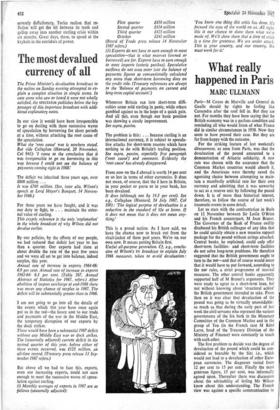The most devalued currency of all
The Prime Minister's devaluation broadcast to the nation on Sunday evening attempted to ex- plain a complex situation in simple terms. In case some who saw or heard it were not wholly satisfied, the SPECTATOR publishes below the key passages of this important broadcast with addi- tional explanatory notes.
In our view it would have been irresponsible to go on dealing with these successive waves of speculation by borrowing for short periods at a time, without attacking the root cause of the speculation.
What the 'root cause' was is nowhere stated. But vide Callaghan (Hansard, 20 November, Col 941): 'I came to the conclusion that it was irresponsible to go on borrowing in this way because I could not see the balance of payments coming right in 1968.'
The deficit we inherited three years ago, over £800 million . . .
It was £760 million. (See, inter alio, Wilson's speech at Lord Mayor's Banquet, 14 Novem- ber 1966.) For three years we have fought, and it was our duty to fight, to . . . maintain the exter- nal value of sterling.
This cryptic reference is the only 'explanation' in the whole broadcast of why Wilson did not devalue earlier.
By our policies, by the efforts of our people, we had reduced that deficit last year to less than a quarter. Our exports had risen at about double the rate of the past few years and we were all set to get into balance, indeed surplus, this year.
Annual rate of increase in exports 1964-66: 6.9 per cent. Annual rate of increase in exports 1962-64: 6.3 per cent. (Table 267, Annual Abstract of Statistics for 1967, refers.) After abolition of import surcharge at end-1966 there was never any chance of surplus in 1967. The deficit will be substantially greater than in 1966.
I am not going to go into all the details of the events which this year have once again put us in the red—the heavy cost to our trade and payments of the war in the Middle East, the temporary disruption of our exports by the dock strikes.
There would have been a substantial 1967 deficit without any Middle East war or dock strikes. The (seasonally adjusted) current deficit in the second quarter of this year, before either of these events occurred, was £125 million, an all-time record. (Treasury press release 13 Sep- tember 1967 refers.) But above all we had to face this, exports, even our increasing exports, could not earn enough to meet the successive waves of specu- lation against sterling.
(i) Monthly averages of exports in 1967 are as follows (seasonally adjusted):
First quarter f450 million Second quarter £434 million Third quarter £425 million October 1'341 million (Board of Trade press release 14 November 1967 refers.)
(ii) Exports do not have to earn enough to meet speculation—that is what reserves (owned or borrowed) are for. Exports have to earn enough to meet imports (ceteris paribus). Speculative outflows do not even enter into the balance of payments figures as conventionally calculated any more than short-term borrowing does on the credit side. (Treasury references are always to the 'Balance of payments on current and long-term capital account.')
Whenever Britain ran into short-term diffi- culties some sold sterling in panic, while others gambled against us in the hope of a quick gain. And all this, even though our basic position was showing a steady improvement.
See supra, passim.
The problem is this: . .. because sterling is an international currency, it is subject to specula- tive attacks for short-term reasons which have nothing to do with Britain's trading position. See supra, passim. especially first paragraph ('root cause') and comment. Evidently the 'root cause' has already disappeared.
From now on the £ abroad is worth 14 per cent or so less in terms of other currencies. It does not mean, of course, that the £ here in Britain, in your pocket or purse or in your bank, has been devalued.
It does (although not by 14.3 per cent). See e.g., Callaghan (Hansard, 24 July 1967, Col 100): 'The logical purpose of devaluation is a reduction in the standard of life at home. If it does not mean that it does not mean any- thing.'
This is a proud nation. As I have said, we have the chance now to break out from the strait-jacket of these past years. We're on our own now. It means putting Britain first.
Useful all-purpose peroration. Cf, e.g., conclu- sion of Wilson's TV broadcast to explain July 1966 measures, taken to avoid devaluation : 'You know one thing this crisis has done. Ifs focused the eyes of the world on us. All right, this is our chance to show them what we're made of. We'll show them that a time of crisis is a time for greatness. We are under attack. This is your country, and our country. We must work for it.'














































 Previous page
Previous page